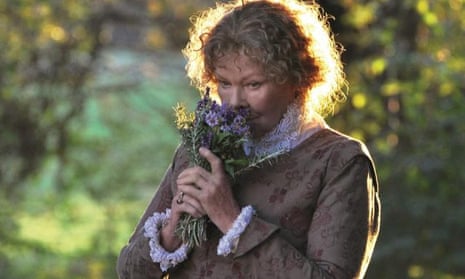Ben Elton has written a sweet-natured, melancholy film about the retirement years of someone he’s lately been turning into his specialist subject: William Shakespeare. The great poet is played here with genial sympathy by the film’s director, Kenneth Branagh, sporting a pretty outrageous false nose. Judi Dench is his wife Anne Hathaway, wearied into resilient impassivity by grief, the unfairness of life and an awful secret. Ian McKellen has a colossal, emphatically wigged cameo as the ageing Earl of Southampton.
All Is True is sentimental, theatrical, likable – and unfashionable. There’s a cheekily imagined backstory for Shakespeare’s famous “second-best bed”. It doesn’t go for grand gestures or big subversive laughs, like John Madden’s romance Shakespeare In Love (1998) or Roland Emmerich’s Shakespeare-was-a-fraud caper Anonymous (2011), or in fact Elton’s own rather brilliant and under-recognised TV Bardcom Upstart Crow which features David Mitchell as Shakespeare, Liza Tarbuck as Anne Hathaway and Helen Monks as his stroppy daughter Susanna. Upstart Crow boldly tackled the death of Shakespeare’s son Hamnet at the age of 11 and Elton reopens that wound now, making it the emotional centre of his film. There are certain structural similarities between All Is True and Upstart Crow, although William and Anne are more muted and autumnal here. The stroppiness of the daughter – in this case Judith, sister of Susanna – continues unabated, but is repurposed dramatically. Dench is enigmatic and stoic as Anne; and Kathryn Wilder is an angry and unreconciled Judith. She has some serious issues with her absent patriarch.
Some may prefer Upstart Crow. I found myself thinking of a speech I saw Elton give in the 90s. He was introduced by AN Wilson, who mischievously pointed out that Elton’s uncle was the historian Geoffrey Elton, but claimed that Sir Geoffrey’s studies of Tudor England were far less interesting than Ben Elton and Richard Curtis’s TV series Blackadder in its Elizabethan phase. Elton bounded on stage, saying: “Poor Uncle Geoff. Dead two years and still getting bad reviews.”
All Is True borrows the mysterious alternative title appended to the late play Henry VIII by William Shakespeare (and John Fletcher, not mentioned here). It was the final production at the Globe theatre, which burned down mid-show in 1613 due to a misfiring cannon. The film mixes aspects of the accepted record with some conjectural what-ifs, and stuff that is straightforwardly made up. There is a fictional invention interestingly based on the date of Hamnet’s death.
The film imagines Shakespeare coming home to Stratford for good after the fire, yearning for a prosperous and peaceful retirement but now forced to confront long-suppressed feelings about the death of his son 17 years before. He must deal with the angry, conflicted and still unmarried Judith, and her troubled sister Susanna, married to Dr John Hall – and also his stolidly unimpressed wife Anne. Both daughters create social upset for Shakespeare, who despite his fame is yearning for bourgeois respectability in the provinces. But the awful memory of Hamnet keeps coming back. He angrily disputes ownership of grief with Anne and Judith, pointing out that he feels as deeply as they. But Dench brings an acid rebuke to Anne’s reply that, at the time of his Hamnet’s death, he was writing The Merry Wives of Windsor.
There is a very nice scene in which McKellen’s Earl returns for a chat with Shakespeare, scorning the cringing flattery of the oleaginous MP Sir Thomas Lucy (Alex Macqueen), and preferring only to talk with William himself, who is instantly turned into a blushing subordinate in the presence of the aristocrat whose bygone beautiful youth had inspired his sonnets. Southampton is coolly amused by Shakespeare’s ridiculous striving for social status – and then blandly astonished at Shakespeare apparently continuing to have feelings for him. Shakespeare himself recites his 29th sonnet: “For thy sweet love remembered such wealth brings / That then I scorn to change my state with kings” – and makes it sound like an agonised declaration of love. Southampton repeats the lines back to him and changes their meaning entirely with his tone: no longer about fierce love, but about the absurdity of such emotions in the face of art’s greatness. It is an elegantly managed exchange.
Other moments are less sure, and there are a fair number of people turning up to tell Shakespeare how great he is, while he looks down with a rueful, all-knowing smile. He is not exactly Prospero breaking his staff or Lear resenting his daughters; more a hardworking professional who has decided that enough is enough. Opinions may divide about the big reveal, but I liked the long scenes of winter drear, as William and Anne huddle together in a corner of a dark room, flickeringly lit by firelight like a cave.
